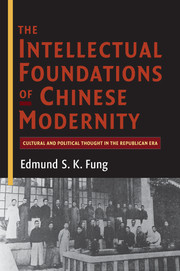 The Intellectual Foundations of Chinese Modernity
The Intellectual Foundations of Chinese Modernity Book contents
- Frontmatter
- Contents
- Acknowledgements
- Abbreviations
- A Note on Romanization
- Introduction
- 1 The Push of Westernized Radicalism
- 2 The Pull of Cultural Conservatism
- 3 The Politics of Modern Chinese Conservatism
- 4 Liberalism in China and Chinese Liberal Thought
- 5 The State, Government and the Rule of Law
- 6 The Rise of Reformist Socialist Thought
- 7 From State Socialism to Social Democracy
- Conclusion
- Glossary
- Selected Bibliography
- Index
- References
5 - The State, Government and the Rule of Law
Published online by Cambridge University Press: 03 May 2010
- Frontmatter
- Contents
- Acknowledgements
- Abbreviations
- A Note on Romanization
- Introduction
- 1 The Push of Westernized Radicalism
- 2 The Pull of Cultural Conservatism
- 3 The Politics of Modern Chinese Conservatism
- 4 Liberalism in China and Chinese Liberal Thought
- 5 The State, Government and the Rule of Law
- 6 The Rise of Reformist Socialist Thought
- 7 From State Socialism to Social Democracy
- Conclusion
- Glossary
- Selected Bibliography
- Index
- References
Summary
This chapter continues our exploration of Chinese liberal thought by probing the underlying issues of political modernity in terms of state power, good government, political elitism and institutional development. From the beginning of the Republican era, the quest for modernity was a state-building project. The modern state is a complex organization with the following characteristics: a defined territory, popular sovereignty, a rational bureaucracy, rule of law, industrialism, the use of rational technologies, a national economy, a sizable bourgeoisie, democratic institutions, a national taxation system and universal education. Externally, the modern state obeys international law, has a national armed force and is prepared to go to war to defend its sovereignty, territorial integrity and national interests. As such, the modern state was a tall order for Republican China's state builders. The early Republic was at best a political experiment and at worst a shoddy political structure ruled by a succession of militarists after the death of President Yuan Shikai until 1928. Even after 1928, the military was in the ascendant. Industrialization was only just beginning, civil society was weak, law and order were poorly maintained, a rational administration was nonexistent and the foreign threat was ever increasing. The challenges for the state builders were enormous. A key question for them was: What sort of government was best suited to China's conditions, and what was the role of the state?
From the classical liberal point of view, the best state is the minimal state, and the best government governs least.
- Type
- Chapter
- Information
- The Intellectual Foundations of Chinese ModernityCultural and Political Thought in the Republican Era, pp. 159 - 190Publisher: Cambridge University PressPrint publication year: 2010


